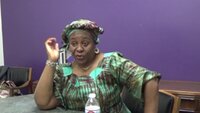| Title |
Effiong, Joan OH19_035 |
| Creator |
Weber State University, Stewart Library: Oral History Program. |
| Contributors |
Effiong, Joan, Interviewee; Rands, Lorrie, Interviewer; Thompson, Michael, Video Technician |
| Description |
The Beyond Suffrage Project was initiated to examine the impact women have had on northern Utah. Weber State University explored and documented women past and present who have influenced the history of the community, the development of education, and are bringing the area forward for the next generation. The project looked at how the 19th Amendment gave women a voice and representation, and was the catalyst for the way women became involved in the progress of the local area. The project examines the 50 years (1870-1920) before the amendment, the decades to follow and how women are making history today. |
| Abstract |
The following is an oral history interview with Joan Effiong, conducted on April 4, 2019, at Weber State University, by Lorrie Rands. Joan discusses her life, her memories, and the impact of the 19th Amendment. Michael Thompson, the video technician, is also present during this interview.; The following is a video clip from an oral history interview with Joan Effiong, conducted on April 4, 2019, by Lorrie Rands. In this video clip, Joan discusses the women who empowered and inspired her throughout her life and career. |
| Image Captions |
Joan Effiong 4 April 2019; Joan Effiong speaking about the women in her life who empowered and inspired her. |
| Subject |
Voting--United States; Women--suffrage; Women--Rights of women; Communication--Study and teaching |
| Keywords |
Female voters; Female community leaders; 19th Amendment |
| Digital Publisher |
Stewart Library, Weber State University, Ogden, Utah, United States of America |
| Date |
2019 |
| Date Digital |
2019 |
| Temporal Coverage |
1954; 1955; 1956; 1957; 1958; 1959; 1960; 1961; 1962; 1963; 1964; 1965; 1966; 1967; 1968; 1969; 1970; 1971; 1972; 1973; 1974; 1975; 1976; 1977; 1978; 1979; 1980; 1981; 1982; 1983; 1984; 1985; 1986; 1987; 1988; 1989; 1990; 1991; 1992; 1993; 1994; 1995; 1996; 1997; 1998; 1999; 2000; 2001; 2002; 2003; 2004; 2005; 2006; 2007; 2008; 2009; 2010; 2011; 2012; 2013; 2014; 2015; 2016; 2017; 2018; 2019 |
| Medium |
oral histories (literary genre) |
| Spatial Coverage |
Calabar, Calabar Municipal, Cross River, Nigeria, http://sws.geonames.org/2346229, 4.95893, 8.32695; Ogden, Weber County, Utah, United States, http://sws.geonames.org/11788968, 41.22809, -111.96766 |
| Type |
Text; Image/StillImage; Image/MovingImage |
| Access Extent |
34 page PDF; Video clip is an mp4 file, 156 MB |
| Conversion Specifications |
Filmed using a Sony HDR-CX430V digital video camera. Sound was recorded with a Sony ECM-AW3(T) bluetooth microphone. Transcribed using Express Scribe Transcription Software Pro 6.10 Copyright NCH Software. |
| Language |
eng |
| Rights |
Materials may be used for non-profit and educational purposes, please credit University Archives; Weber State University; Music in opening sequence is from uppbeat.io, https://uppbeat.io/t/simon-folwar/hope; License code KYI5VLB63GF1TXND; Music in closing sequence is from uppbeat.io, https://uppbeat.io/t/yeti-music/gentle-breeze; License code: IWGKRYG7XHQOMZY0 |
| Source |
Effiong, Joan OH19_035 Weber State University Archives |
| Format |
application/pdf; video/mp4 |
| ARK |
ark:/87278/s6swtv7c |
| Setname |
wsu_bs_oh |
| ID |
105446 |
| Reference URL |
https://digital.weber.edu/ark:/87278/s6swtv7c |
| Title |
Effiong, Joan OH19_035 |
| Creator |
Weber State University, Stewart Library: Oral History Program. |
| Contributors |
Effiong, Joan, Interviewee; Rands, Lorrie, Interviewer; Thompson, Michael, Video Technician |
| Description |
The Beyond Suffrage Project was initiated to examine the impact women have had on northern Utah. Weber State University explored and documented women past and present who have influenced the history of the community, the development of education, and are bringing the area forward for the next generation. The project looked at how the 19th Amendment gave women a voice and representation, and was the catalyst for the way women became involved in the progress of the local area. The project examines the 50 years (1870-1920) before the amendment, the decades to follow and how women are making history today. |
| Abstract |
The following is an oral history interview with Joan Effiong, conducted on April 4, 2019, at Weber State University, by Lorrie Rands. Joan discusses her life, her memories, and the impact of the 19th Amendment. Michael Thompson, the video technician, is also present during this interview. |
| Image Captions |
Joan Effiong 4 April 2019 |
| Subject |
Voting--United States; Women--suffrage; Women--Rights of women; Communication--Study and teaching |
| Keywords |
Female voters; Female community leaders; 19th Amendment |
| Digital Publisher |
Stewart Library, Weber State University, Ogden, Utah, United States of America |
| Date Digital |
2019 |
| Temporal Coverage |
1954; 1955; 1956; 1957; 1958; 1959; 1960; 1961; 1962; 1963; 1964; 1965; 1966; 1967; 1968; 1969; 1970; 1971; 1972; 1973; 1974; 1975; 1976; 1977; 1978; 1979; 1980; 1981; 1982; 1983; 1984; 1985; 1986; 1987; 1988; 1989; 1990; 1991; 1992; 1993; 1994; 1995; 1996; 1997; 1998; 1999; 2000; 2001; 2002; 2003; 2004; 2005; 2006; 2007; 2008; 2009; 2010; 2011; 2012; 2013; 2014; 2015; 2016; 2017; 2018; 2019 |
| Medium |
oral histories (literary genre) |
| Spatial Coverage |
Calabar, Calabar Municipal, Cross River, Nigeria, http://sws.geonames.org/2346229, 4.95893, 8.32695; Ogden, Weber County, Utah, United States, http://sws.geonames.org/11788968, 41.22809, -111.96766 |
| Type |
Text; Image/StillImage |
| Access Extent |
34 page PDF |
| Language |
eng |
| Rights |
Materials may be used for non-profit and educational purposes, please credit University Archives; Weber State University |
| Source |
Effiong, Joan OH19_035 Weber State University Archives |
| Format |
application/pdf |
| Setname |
wsu_bs_oh |
| ID |
105581 |
| Reference URL |
https://digital.weber.edu/ark:/87278/s6swtv7c/105581 |





